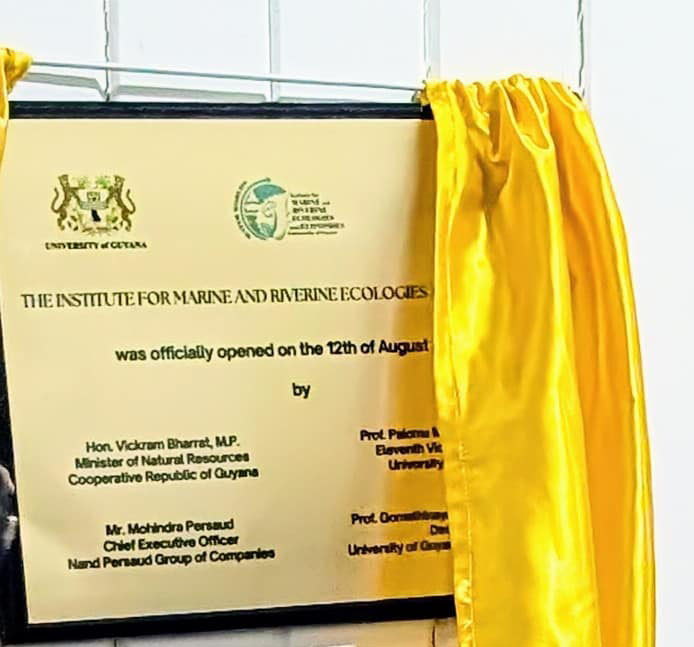-expected to benefit Region Six fishing industry
The University of Guyana, Berbice Cam-pus (UGBC) on Monday launched its new Institute for Marine and Riverine Ecolo-gies and Economies (IMAREE) which is expected to of significant benefit to the fishing industry in Region Six, a Ministry of Public Works release stated on Tuesday.
Minister of Public Works, Juan Edghill, who delivered the keynote address at the opening ceremony held at the campus’ John’s Science Centre, spoke of the importance of such an institute to tertiary education.
“The launch of the Institute for Marine and Riverine Ecologies and Economies is a most appropriate and critical addition to the repertoire of our nation’s premier tertiary educational institution. Particularly, in a nation that boasts the title, ‘The Land of Many Waters’. Water is an essential part of everyday life in Guyana, permeating both the mundane and complex aspects of our lives. Yet oftentimes, while traversing these waterways, the ordinary person takes for granted two things: 1) the fact that there is life below those waters; and 2) the ways in which these very waterways preserve our existence.”
The Minister also asserted that this initiative would be particularly beneficial to Region Six, since the region boasts a substantial fishing industry, while he highlighted government’s interventions to support the livelihoods of fisherfolk in the region, especially in the area of brackish-water shrimp production.
“In Berbice in particular, there is a large fishing community, that not only produces a large portion of the seafood consumed on the local market, but also provides a means of income for a substantial part of the population in this region. Brackish-water shrimp production is one of the initiatives that is unique to Berbice and the Government of Guyana has made significant investments in this niche area. Thus, in January of this year, the earnings estimated from brackish water shrimp production for the period January to November 2023 was $1.3 billion.”
Edghill took the opportunity to express concern for the crises being faced by water bodies as a result of the negative impacts of climate change, pollution, and loss of biodiversity, caused by overexploitatation and other human action. He also commended the University of Guyana for this timely initiative.
“It is high time that we focus our scholarship on the examination and chronicling of the marine and riverine resources that our nation has been imbued with, toward a view of sustainable usage and rehabilitation where necessary. For taking this remarkable step in the right direction, I commend the University of Guyana.”
He also mentioned the initiatives taken by both government and the Ministry of Public Works geared towards managing Guyana’s marine resources sustainably, while supporting livelihoods and mitigating the effects of climate change, with an emphasis on Guyana’s Martitime Economy Plan.
“Guyana’s Martitime Economy Plan provides an overview of the existing maritime economy of Guyana and sets out priorities and actions that aim to help Guyana demonstrate a clear vision and direction that takes account of national issues, international commitments, and the challenges of a Small Developing State. Actions support economic growth, livelihoods, and jobs, and a reduction in losses from natural hazards, extreme weather events, and climate change. The overall objective is to help grow the national economy in a way that reflects the aims of the Commonwealth Charter, including good governance, sustainable development, and gender equality, while recognising the needs of small and vulnerable States.
Edghill also acknowledged that progress towards a blue economy could help achieve a range of United Nations Sustainable Development Goals (SDGs), including SDG 14 – Life Below Water, SDG 5 – Gender Equality, SDG 8 – Decent Work and Economic Growth, SDG 7 – Affordable and Clean Energy, and SDG 11 – Sustainable Cities and Communities.
He also assured that the Ministry of Public Works is cognizant of its critical role in supporting the livelihoods of coastal dwellers and individuals who rely on our water ways for survival, as well as the mitigation of the effects of climate change. “We have invested significantly in sea defence structures and will continue to do so, working in collaboration with local communites to meet their growing needs.”
The speakers at the launch of the Institute included Minister of Natural Resources, Vickram Bharrat; Director of UGBC, Professor Gomathinyagam Subrimanian; Deputy Director of UGBC, Dr Pamela Rose; Chancellor of the University of Guyana, Professor Edward Greene; Vice-Chancellor of the University of Guyana, Professor Paloma Mohamed-Martin; and Director of IMAREE, Calvin Bernard.





